The Future of Airlines: How AI and Automation Are Revolutionizing the Aviation Industry
 12 September 2023
12 September 2023Throughout history, the aviation industry has remained an unwavering pioneer of ingenuity, ceaselessly endeavoring to elevate the realms of safety, efficiency, and the cherished voyage of every passenger. In recent years, the sector has witnessed a significant transformation with the advent of artificial intelligence (AI) and automation. These cutting-edge technologies have revolutionized how airlines operate, making them more efficient, reliable, and secure than ever before.
AI can reduce the risk of accidents and human errors by providing real-time data analysis and predictive insights. Airlines can harness the power of AI to predict when maintenance is needed, allowing them to address potential issues and avoid costly delays. AI can optimize fuel consumption, reduce emissions, and enhance the overall sustainability of the aviation industry.
From generative AI creating virtual air traffic controllers to revolutionizing aircraft maintenance. The industry has seen firsthand the immense benefits that AI and automation bring. In this article, we will explore how AI and automation are transforming the airline industry and discuss the future implications of these advancements.
What is Ai?
Artificial Intelligence, that can also called Ai, refers to the simulation of human intelligence processes by machines, especially computer systems. These types of amazing systems utilize algorithms and computing power to perform tasks. That normally requires human intellect, such as decision-making, pattern recognition, and learning. The foundation of AI technology lies in its ability to process large amounts of data and learn from it.

The applications of AI are vast and growing exponentially with advancements in technology. From healthcare to finance, transportation to entertainment, there’s hardly any sector untouched by this revolutionary technology. In the aviation industry, too, Ai is paving the way for significant transformations.
AI algorithms are designed to mimic the cognitive functions of humans. They possess the capability to learn from experience just like human beings do. These algorithms become more accurate in their predictions and decisions, leading up a pathway towards automation.
AI systems leverage these algorithms and massive computational power for swiftly processing complex data sets. This results in efficient problem-solving capabilities, which were unimaginable a few decades ago.
How Artificial Intelligence is Revolutionizing Industries?
Technological advancements, particularly in intelligent systems, are forging a new path for numerous sectors. Central to this paradigm shift is the role of artificial intelligence (AI) and automation. A prime example of this transformation can be observed in the aviation industry.
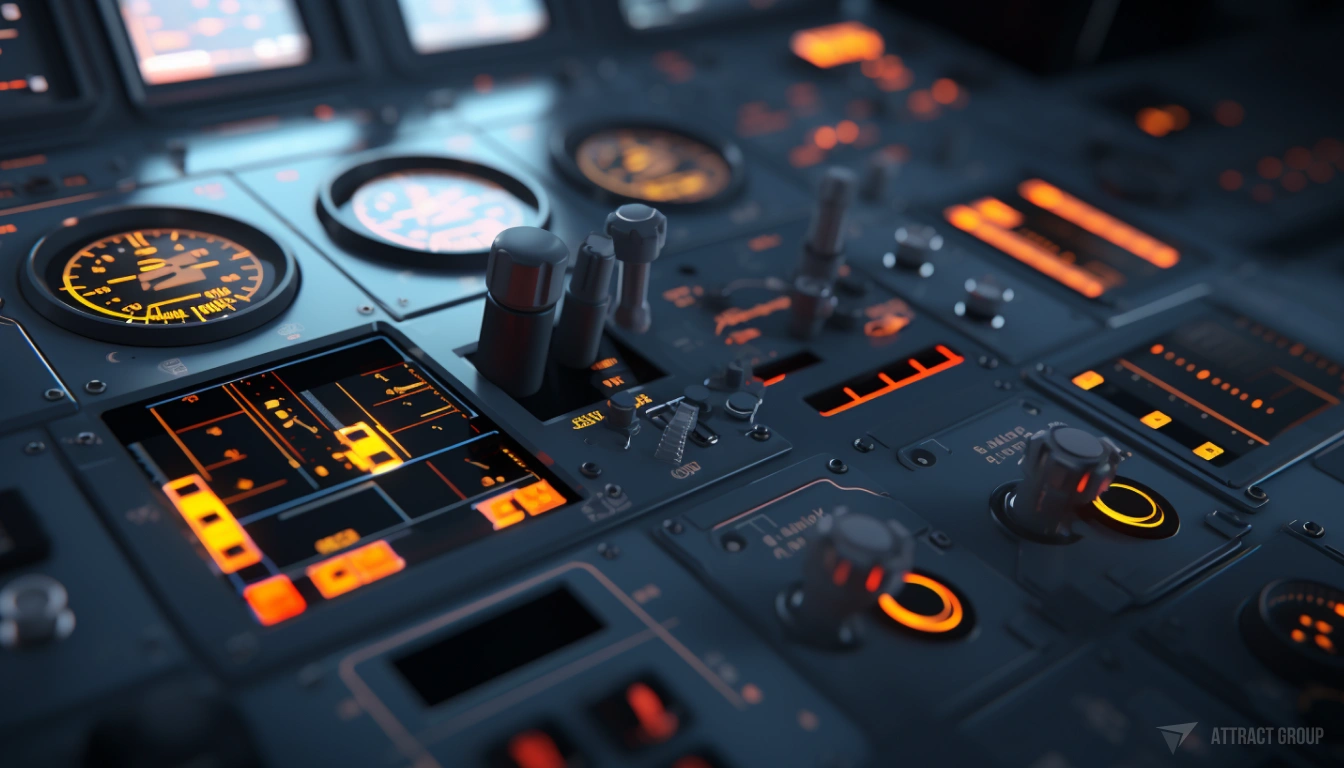
The application of AI in the aviation industry is not only revolutionizing operations; it’s also redefining the future landscape. AI has been instrumental in enhancing safety protocols, improving efficiency, reducing costs, and elevating customer service levels. Machine learning algorithms have made predictive maintenance possible, identifying potential issues before they occur, thus preventing costly disruptions and ensuring passenger safety.
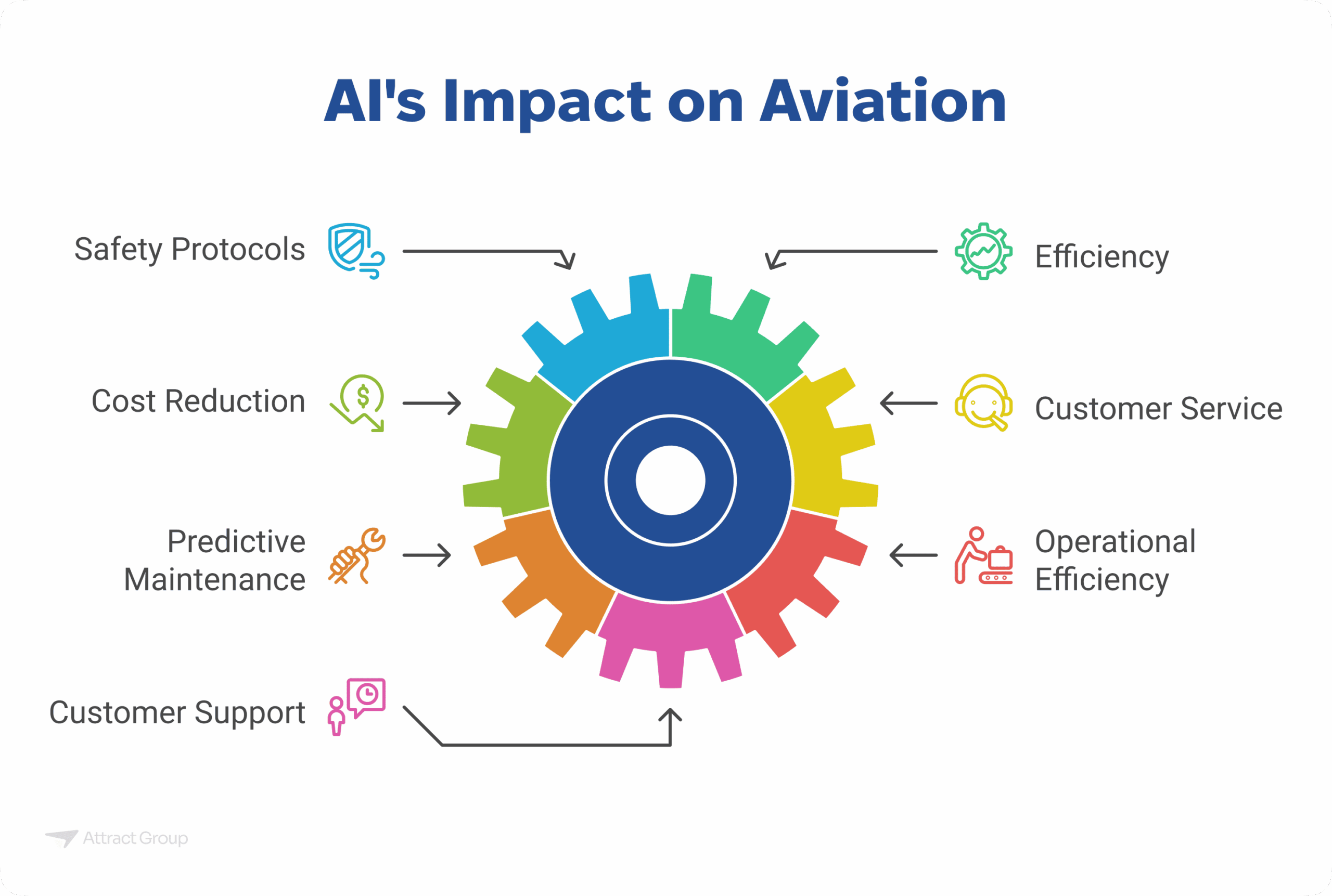
Moreover, AI-powered robots are increasingly utilized for mundane tasks such as cleaning or luggage handling, significantly increasing operational efficiency. AI-driven chatbots provide swift responses to customer queries around the clock.
A culmination of these factors suggests that AI is revolutionizing the aviation industry, an evolution expected to continue as technology advances. With artificial intelligence in aviation growing at an unprecedented rate, AI will anchor the future of the aviation industry.
Why is AI important in the Aviation industry?
In the realm of flight operations and related sectors, the significance of intelligent systems cannot be understated. These technologies are integral to ensuring safety, enhancing efficiency, curtailing expenses, and elevating customer service. The use of AI in aviation has transformed operational processes. Automation is now commonplace and vital for maintaining competitive advantage in the airline industry.
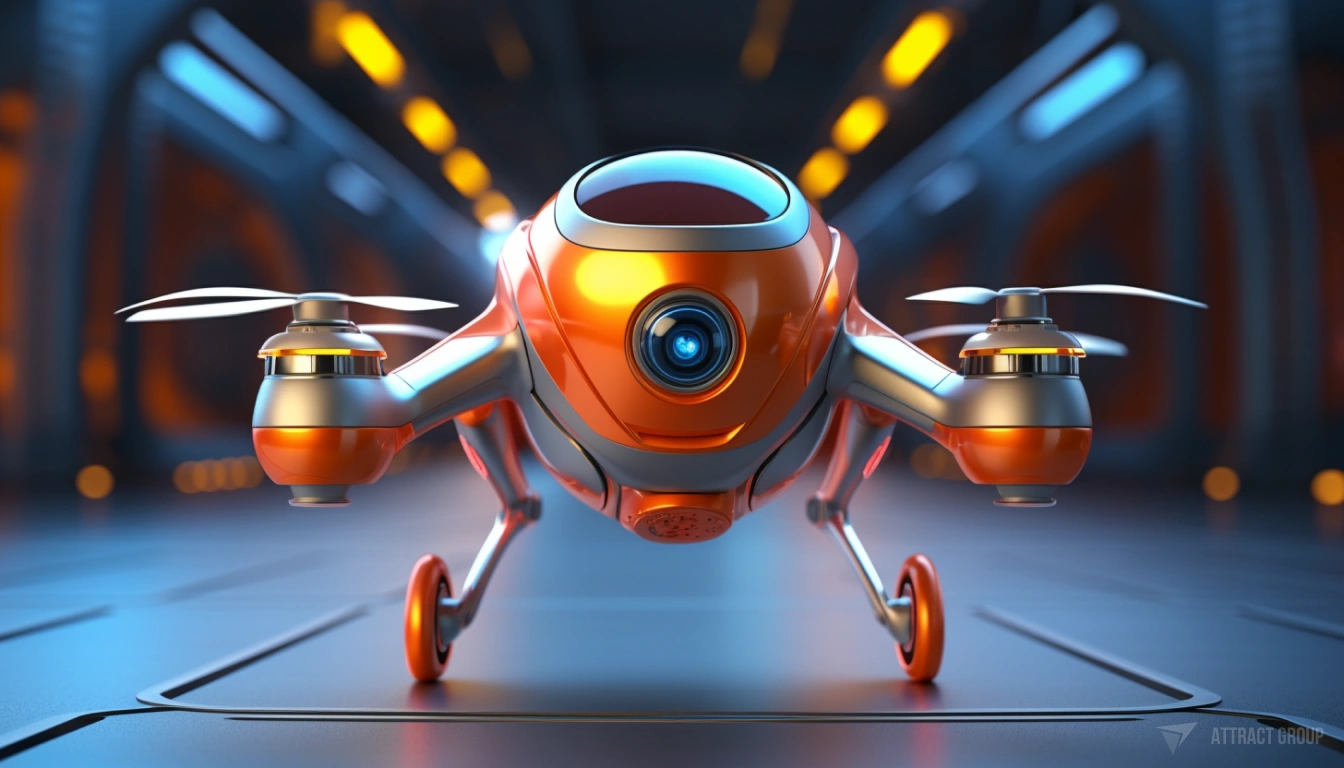
AI in the airline industry has opened up a wealth of possibilities, such as predictive maintenance, optimization of fuel consumption, autonomous drones for inspections, and baggage handling robots. These technological innovations have demonstrated that AI in aviation offers multifaceted benefits to airlines and passengers by improving punctuality rates and reducing flight cancellations.
The importance of AI in aviation extends beyond mere financial gains or enhanced customer experience. It plays a crucial role in augmenting safety measures. Automated systems can predict weather changes more accurately than human pilots, reducing flight risk.
Thus, it is clear that AI and automation are revolutionizing the airline industry by creating safer skies while simultaneously boosting productivity and profitability.
What is The Role of AI in Modern Aviation?
The role of Artificial Intelligence (AI) in modern aviation is increasingly vital, addressing numerous challenges across different facets of the industry. It offers potential solutions for improving operational efficiency through route optimization and predictive analysis for aircraft maintenance. These types of techniques are aimed at reducing operational costs and enhancing profitability.
AI significantly contributes to personalizing the passenger experience by providing tailored travel recommendations, facilitating seamless check-ins with AI-driven kiosks and biometrics, and employing chatbots and virtual assistants to respond to passenger queries.
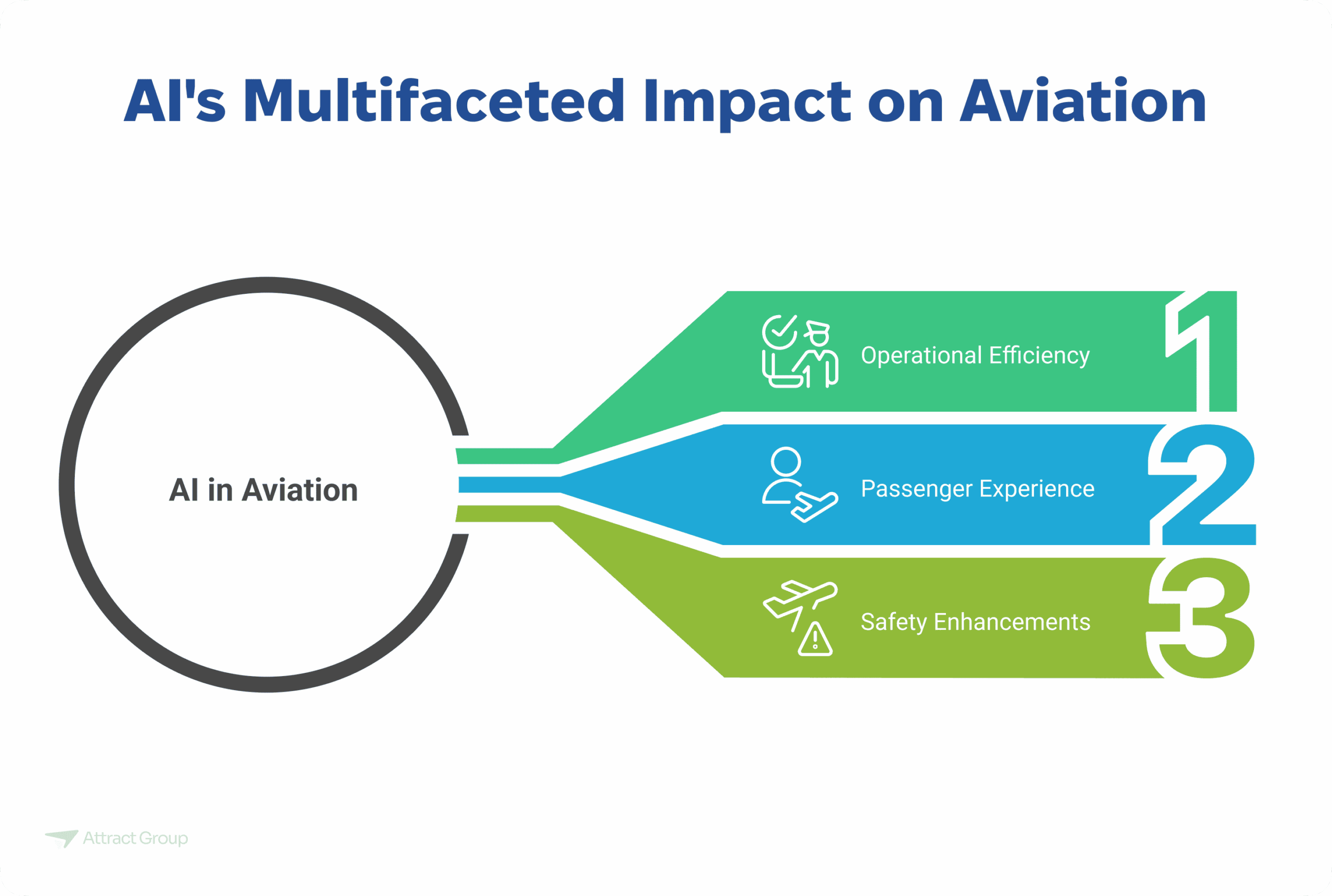
Safety enhancements are being realized through predictive analytics for flight safety, AI’s application in air traffic management, and automated emergency response systems.
1. Improving Operational Efficiency
Optimization of flight routes through AI technology offers significant potential for reducing operational costs and enhancing profitability in the aviation industry. AI algorithms can analyze vast amounts of data to predict weather patterns, optimize fuel consumption, and suggest the most efficient travel paths.
- AI in aircraft maintenance: Advanced systems detect anomalies and recommend corrective actions, prolonging aircraft lifespan.
- Predictive maintenance: Downtime is minimized by forecasting possible issues before they occur.
- AI-powered predictive maintenance: Combining historical data with real-time information from numerous sensors can predict failures and enhance safety.
- Operational efficiency: Using AI to streamline aircraft operations reduces overheads and boosts performance.
2. Personalizing the Passenger Experience
Transitioning from the operational efficiency domain, it’s important to delve into how AI and machine learning can revolutionize the passenger experience in air travel.

Adopting AI chatbots can enhance safety and efficiency by swiftly addressing customer queries. They are equipped with an immense knowledge base, capable of providing instant responses, significantly improving customer satisfaction.
Furthermore, AI can help airlines deliver personalized experiences by proposing tailored travel recommendations based on passengers’ preferences and past behaviors. Seamless check-ins through AI-driven kiosks and biometrics also contribute to a smoother journey.
These advancements not only revolutionize air traffic procedures but also considerably enhance the overall customer experience in airlines worldwide.
3. Safety Enhancements through AI
Safety enhancements in air travel have been significantly influenced by predictive analytics, which aid in identifying potential flight risks. The integration of AI can play a crucial role in streamlining various aspects of aviation safety, from air traffic management to automated emergency response systems.
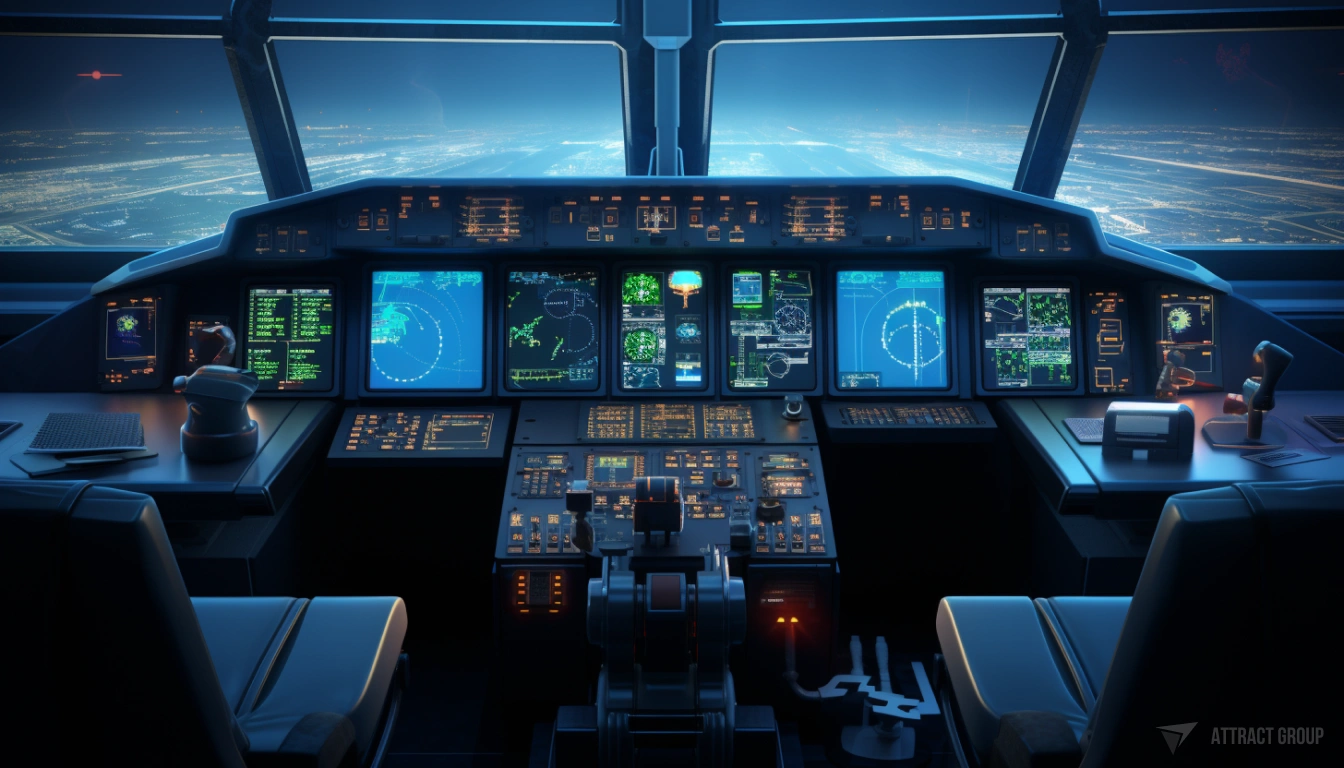
Predictive analytics for flight safety has emerged as an essential tool for risk mitigation.
- AI-powered predictive maintenance can help reduce technical failures, enhancing flight safety.
- Safety enhancements through AI include the development of sophisticated models to predict and mitigate potential threats.
- AI-powered, Automated emergency response systems ensure swift and effective action during critical situations.
- AI implementation in air traffic management facilitates efficient routing and scheduling, minimizing collision risks.
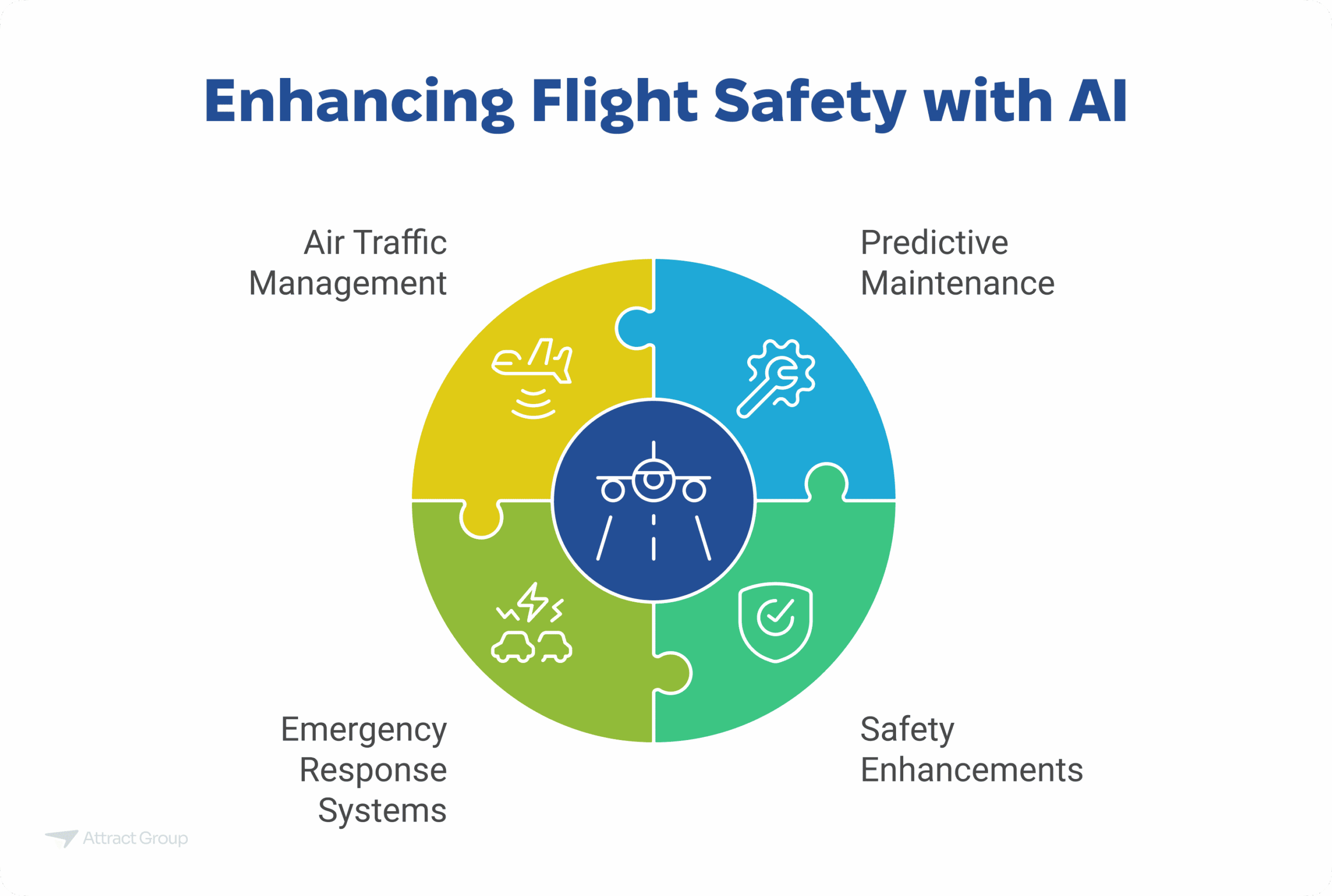
These advancements underscore the transformative potential that artificial intelligence holds for revolutionizing aviation safety.
Our aviation IT experts are ready to guide you.

What is The Impact of AI in Aviation?
The advent of Artificial Intelligence (AI) has significantly transformed the aviation industry, leading to advancements in several key areas worthy of discussion.
AI’s role in automated flight operations is undeniable, particularly in developing advanced autopilot systems and fostering the potential for autonomous aircraft. It further enhances fleet efficiency through predictive maintenance by accurately forecasting maintenance needs and reducing downtime.
AI is instrumental in optimizing air traffic management by mitigating congestion, ensuring safety, and optimizing flight paths. A promising solution to one of aviation’s most enduring challenges. Customer service within the sector has been enriched with AI-powered chatbots and virtual assistants providing timely customer assistance.
1. Automated Flight Operations
Advancements in AI technology have been instrumental in developing advanced autopilot systems, potentially paving the way for fully autonomous aircraft. These AI-powered tools enhance airline operations by improving flight safety and optimizing aircraft performance.
- AI can help predict potential flight disruptions, enabling proactive responses.
- Advanced autopilot systems utilize machine learning to adapt to changing conditions.
- Autonomous aircraft could revolutionize freight transport and air taxi services.
- Enhanced data analysis aids in monitoring aircraft performance and maintenance.
Integrating artificial intelligence into aviation creates an era where flights are safer, more efficient, and potentially pilotless as airlines continue to adopt these advanced technologies. They reshape industry standards, presenting exciting possibilities for the future of flight.
2. Predictive Maintenance
Predictive maintenance, facilitated by machine learning algorithms, significantly enhances fleet efficiency by accurately forecasting aircraft repair and upkeep needs. AI can analyze vast amounts of data from various sources including flight logs, weather reports, and sensor data. This in-depth analysis allows for accurate prediction of when maintenance will be needed, thus revolutionizing aircraft maintenance.
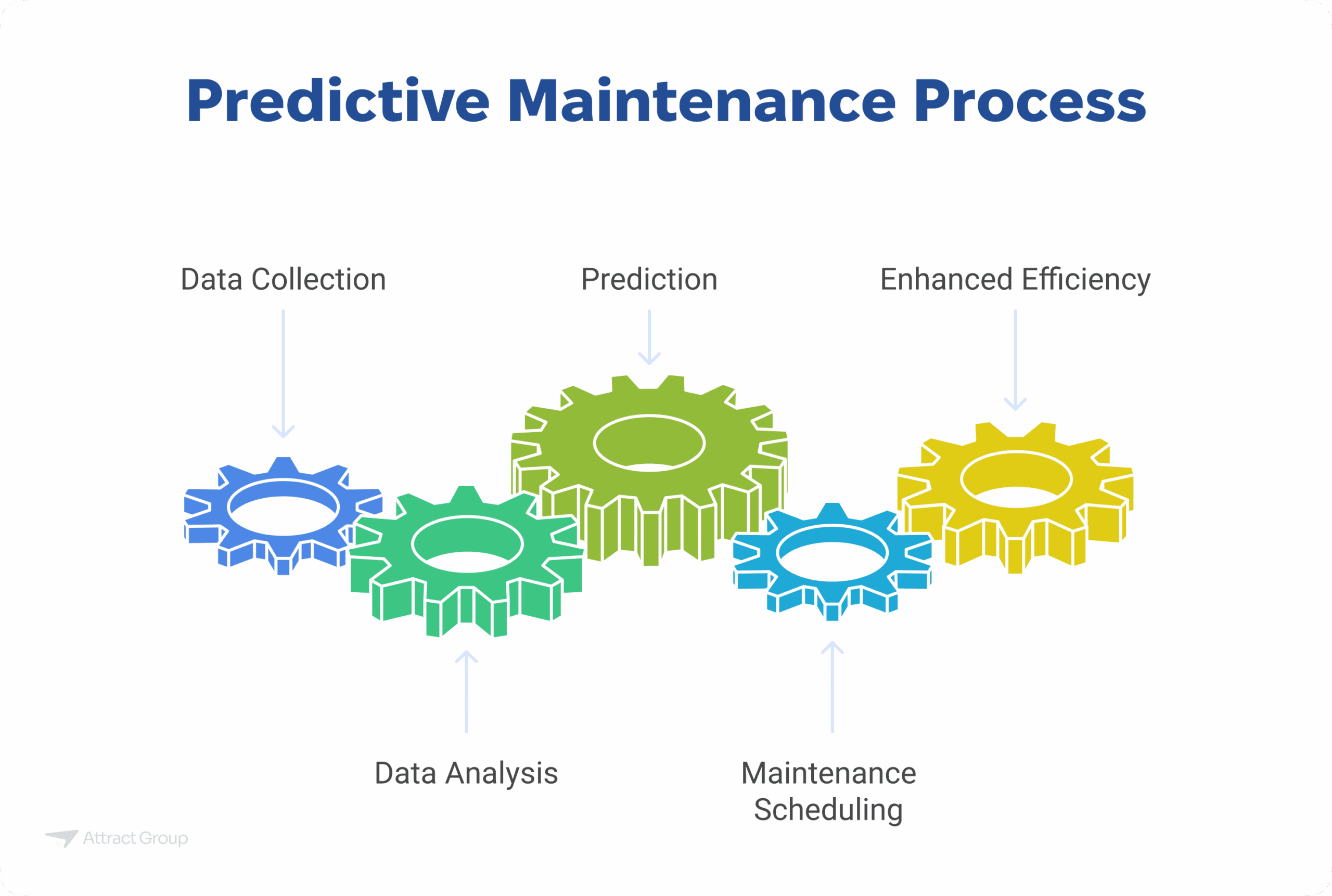
Identifying potential issues before they occur can substantially reduce maintenance costs and minimize downtime. AI can also determine optimal times for routine service checks based on real-time operational data rather than arbitrary timelines. This new approach is set to improve safety standards while boosting aviation industry productivity drastically.
3. Optimized Air Traffic Management
Optimized air traffic management, through sophisticated algorithms, plays a crucial role in mitigating congestion, ensuring safety, and refining flight paths. AI’s revolutionizing air traffic has the potential to enhance security and efficiency greatly. This is achieved by:
- Accurate prediction of weather patterns for optimal routing
- Real-time tracking and adjustment of flight paths
- Automated decision-making during critical situations
- Increased precision in landing approaches
The use of AI in aircraft and air traffic management promises significant benefits. It aids in optimizing flight paths, reducing fuel consumption, and minimizing delays. Therefore, it becomes evident that the integration of AI into the aviation industry is poised to redefine the future landscape.
4. Enhanced Customer Service
The proliferation of AI-powered chatbots and virtual assistants has significantly enhanced customer service in air travel. As the aviation industry embraces these applications of AI, passengers are experiencing streamlined interactions, personalized services, and swift problem resolution.
These intelligent systems enhance communication by providing real-time updates on flight schedules, baggage claims, and airport facilities. AI can also analyze customer data to offer tailored recommendations for hotels or attractions in the destination city.
The use of such technology not only enhances operational efficiency but also augments customer satisfaction levels. Integrating AI-powered chatbots and virtual assistants is revolutionizing enhanced customer service in the aviation industry.
5. Cargo and Warehouse Automation
Significant advancements in artificial intelligence have paved the way for enhanced cargo operations and the potential use of unmanned aerial vehicles, commonly known as drones, within warehousing environments. The aviation sector has seen a surge in AI integration, transforming traditional methods through advanced algorithms.
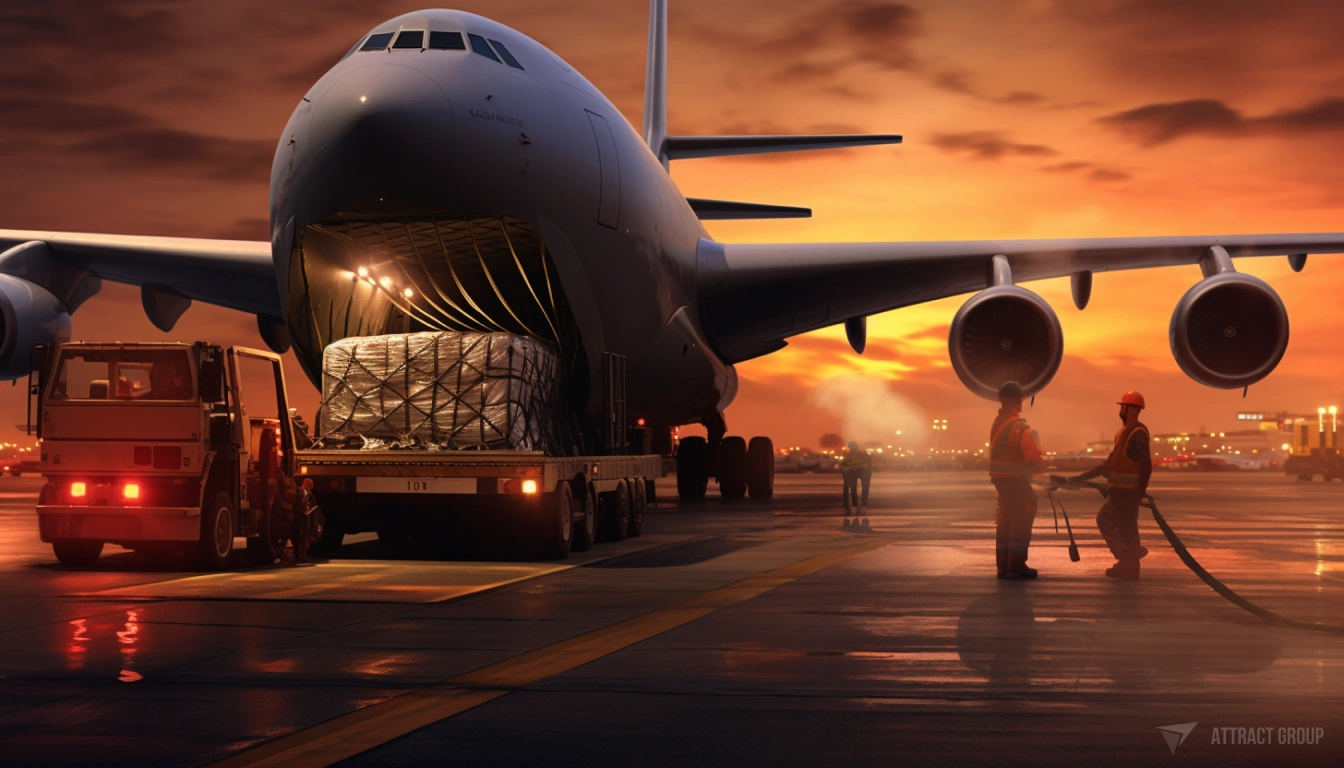
The implementation of AI could revolutionize the process of sorting and transporting cargo. Industry professionals can optimize routes for speed and fuel efficiency by harnessing AI’s power.
Drones provide an alternative solution to human-operated machinery, decreasing error rates significantly. Integrating AI in warehouses has led to increased productivity and improved safety measures. These innovations are reshaping the aviation world, creating efficient systems that increase output while reducing operational costs.
Real-World Implementations of AI in Aviation
Innovative strategies for the application of AI in aviation are being demonstrated by Alaskan Airlines through their system for flight path optimization. This real-world implementation of AI in aviation is designed to increase efficiency, reduce fuel consumption, and minimize environmental impact. The AI system uses machine learning algorithms that analyze historical flight data to recommend optimal routes.
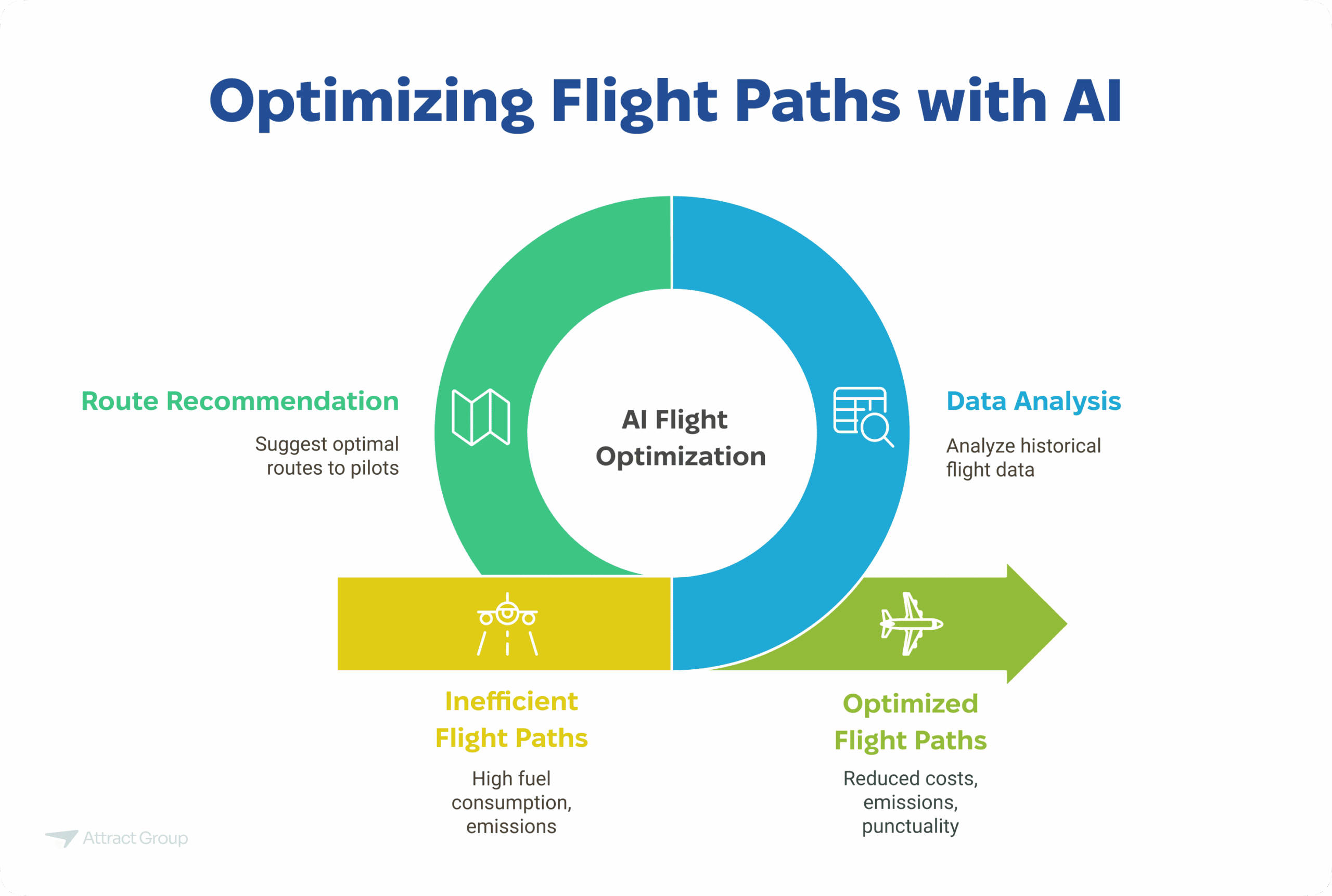
This approach has the potential to revolutionize how airlines manage their operations. It can help airlines significantly decrease operational costs and increase punctuality, a key performance indicator in this industry. It also contributes towards sustainable practices by reducing carbon emissions.
Alaskan Airlines is one of many airlines benefiting from AI’s transformative power. Other leading airlines have adopted similar systems reflecting growing trends within the industry.
What are The Challenges Ahead?
Navigating the trajectory of AI integration in airline industries brings to the fore complex ethical considerations. Such as balancing automation with human employment and deciphering responsibility for decisions made by AI systems.
Key challenges include ensuring passenger privacy amidst AI-driven processes, integrating new technologies seamlessly into existing frameworks, and fostering an environment conducive to continual learning and adaptation.
The successful realization of these aims hinges on effective collaboration between tech companies and airline industries. Alongside a strategic approach to overcoming resistance surrounding technological transformation.
1. Ethical Considerations and AI

Balancing the benefits of automation with the potential impact on employment within the aviation industry presents a complex ethical challenge. AI’s power is revolutionizing airlines’ operations, but integrating AI should recognize human roles.
Key considerations include:
- Embrace AI, but acknowledge that AI cannot replace certain human functions
- Continuous advancements in AI technology and its implications for workforce dynamics
- The responsibility of decisions made by AI systems versus humans
- Ensuring passenger privacy in AI-driven processes
Even as industries harness the power of automation and data analytics, strategies must balance efficiency gains with potential job displacement. While embracing these technological advancements, maintaining privacy standards remains paramount. Ethical guidelines are central to this integration process, guiding how these technologies augment human effort rather than replace it.
2. Ensuring Seamless Integration
Seamless integration of new technologies requires continual learning and adaptation within the business landscape, accentuating the importance of collaboration between technology companies and commercial sectors to overcome resistance to technological transformation.
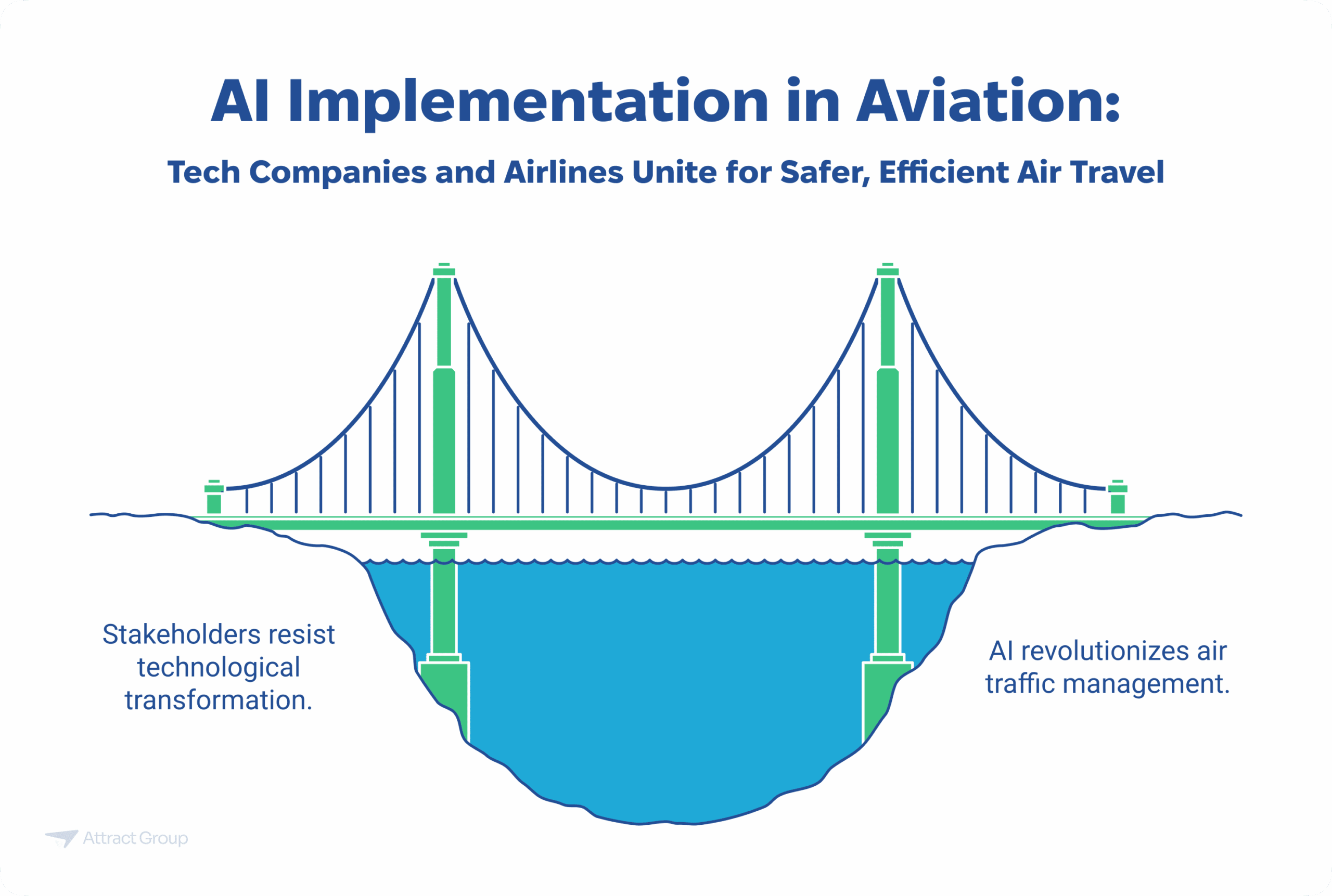
This necessitates a tight-knit alliance between tech companies and airline industries in aviation. AI can provide solutions that are revolutionizing air traffic management, fostering a future where air travel is safer and more efficient. However, ensuring seamless integration poses challenges like overcoming stakeholders’ resistance to drastic changes.
This skepticism can be mitigated by robust education on the potential benefits of these advancements, such as enhanced safety measures, improved operational efficiency, and cost savings – thus underscoring the need for continual learning and adaptation in this dynamic industry context.
Final Thoughts
The transformative power of artificial intelligence is profoundly shaping the future of the aviation industry. As Alaskan Airlines shows, AI offers unprecedented opportunities for airlines worldwide, from enhancing operational efficiency to optimizing flight paths.
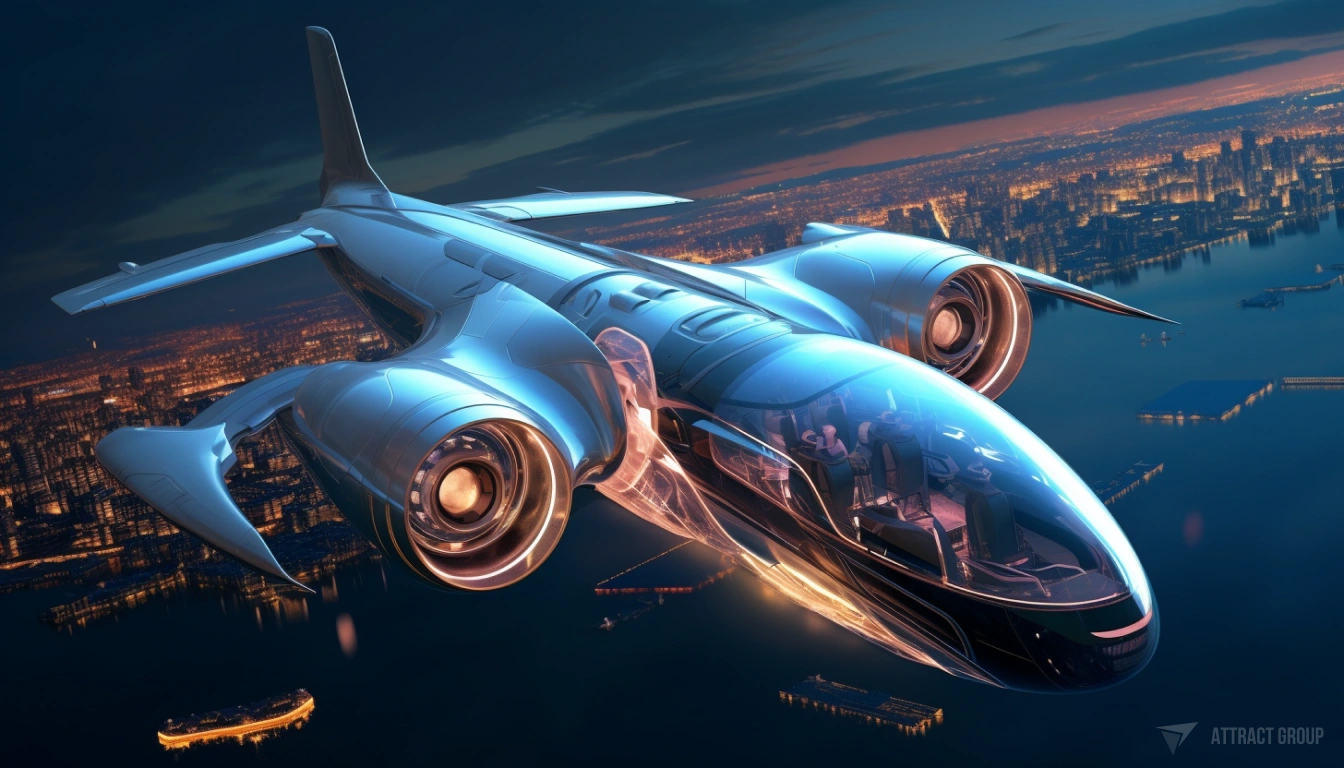
However, with great technological advancement come significant challenges. Therefore, it remains crucial for this industry to navigate these potential hurdles effectively.
Indeed, as an allusion to Icarus’ tale might suggest. While soaring towards the sun of innovation is tempting, a careful and considered ascent will ensure a safe flight into tomorrow’s sky.
Frequently Asked Questions
How Is AI Impacting the Job Market in the Aviation Industry?
Artificial intelligence is significantly transforming the aviation industry’s job market. It automates routine tasks, necessitates new skills for emerging roles, and reshapes traditional jobs, thus demanding a paradigm shift in workforce strategies.
What Are the Ethical Implications of Using AI in Aviation?
Ethical implications of AI in aviation encompass issues related to privacy, security, decision-making autonomy, and job displacement. These concerns necessitate robust discussions on regulatory frameworks and ethical guidelines for AI deployment in this industry.
Are There Any Specific Training Programs for Pilots to Adapt to AI Systems?
Specific training programs exist for pilots to adapt to AI systems, focusing on understanding their operation, limitations, and potential malfunctions. These programs aim to integrate human skills with advanced technological capabilities in aviation.
How Does AI Affect the Pricing Model of Airline Tickets?
AI impacts airline ticket pricing through dynamic pricing models, which analyze large amounts of data to adjust prices in real time based on factors such as demand, competition, and customer behavior.
Is There Any Country Leading in the Implementation of AI in Aviation?
In the domain of AI implementation in aviation, the United States prominently leads, with companies like Boeing and Airbus incorporating advanced machine learning and automation systems into their aircraft design and operational procedures.










